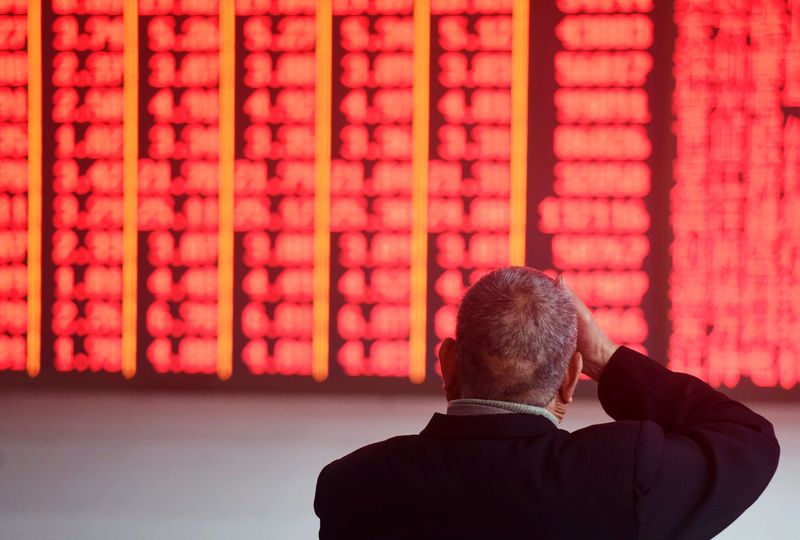By Tom Westbrook and Scott Murdoch
SYDNEY/HONG KONG (Reuters) - A smattering of high-profile Chinese debt defaults this week may give bullish foreign investors pause and likely dampen the debt sales outlook, bankers and analysts said, as a bond market selloff revived worries about flaky government support.
State-owned miner Yongcheng Coal and Electricity Holding Group surprised investors and sparked a regulatory probe by defaulting this week on debt obligations just three weeks after it raised a billion yuan ($151 million).
That follows, among other wobbles, stress at property developer China Evergrande (HK:3333), a trading halt in Tsinghua Unigroup bonds after a debt warning, and the high-profile default last month of BMW partner Huachen Automotive Group.
Spooked traders dumped local debt and sold banking stocks exposed to it on Friday and analysts said the spillover could take some of the heat out of a headlong rush into Chinese debt.
"It just shows market confidence in government support is very shaky, and people are a bit more unsure now, more so than at the beginning of the year," said Judy Kwok-Cheung, a fixed income analyst in Hong Kong at the Bank of Singapore.
"We're still trying to gauge how much support is there still and which kind of entities they will support. We're really watching the market closely now to see who the government will support and who they won't."
Investors have dived into to both sovereign and corporate Chinese debt this year. Some global investors have been particularly bullish on company paper as Chinese firms have paid better yields than similarly-rated U.S. or European debt, even as China has led the global COVID-19 recovery.
Yet, as the rebound has slowed and proven uneven, previously cast-aside risks about high debt loads, fickle cash flows and confusion over the level of state backing have resurfaced.
"When the dust has settled ... I think this kind of weakness is exposed again, and that's why you see more default cases," said Ivan Chung, associate managing director, corporate finance, at Moody's (NYSE:MCO) in Hong Kong.
PRIMARY PAUSE
Market wobbles together with a government push to de-leverage debt-laden property developers are also likely to keep a lid on primary issuance in the remainder of an already lean year.
Chinese high-yield bonds, mostly sold by developers, accounted for 5.4% of the global high-yield market for the year so far, Refinitiv data shows, the smallest proportion since 2017.
"Is the surfacing of credit stress a concern? Definitely it is," said Clifford Lee, global head of fixed income at Singapore's DBS Bank. It would not freeze the market for now, he said, but issuers are hunkering down.
"The thinking is that (issuers) are in better shape and are able to access cash, so ... should not be facing a cash strain in a rush," said another debt banker in Hong Kong, who requested anonymity because they are not authorised to speak to media.
To be sure, $40 billion in Chinese high-yield dollar bonds have been issued this year and some investors will welcome both a shakeout and regulatory scrutiny to strengthen the market.
But the latest clutch of defaults, which Goldman Sachs (NYSE:GS) noted are bigger and include more state-owned enterprises than last year, highlights that close attention is needed to avoid being caught in the credit cleanup.
"China property high-yield continues to be one of our favored sectors," said Goldman analysts Kenneth Ho and Chakki Ting in a note. "But managing idiosyncratic risks is likely to be key."

(GRAPHIC - China's debt pile: https://fingfx.thomsonreuters.com/gfx/mkt/xklpybgbovg/Pasted%20image%201605196373053.png)